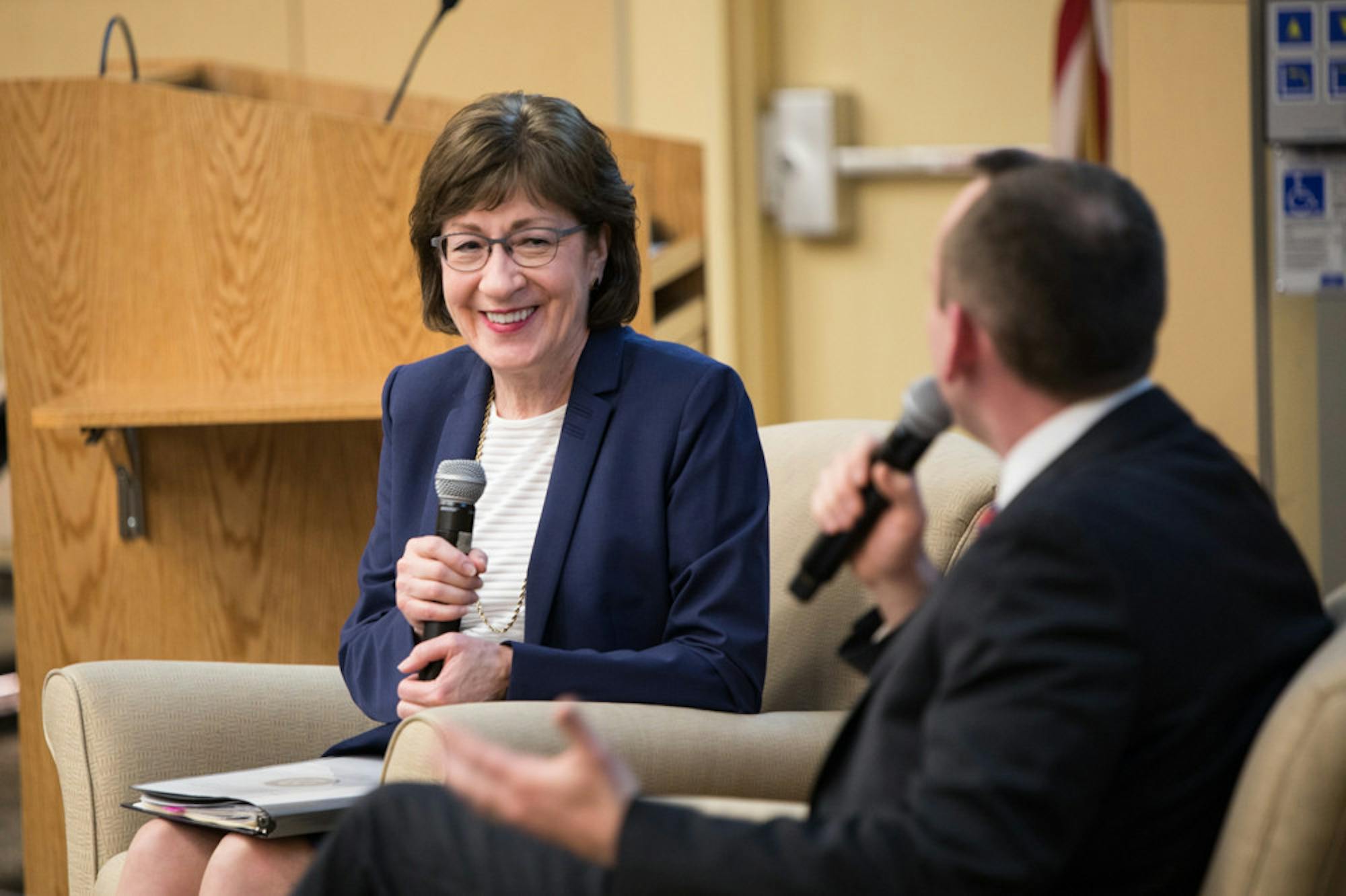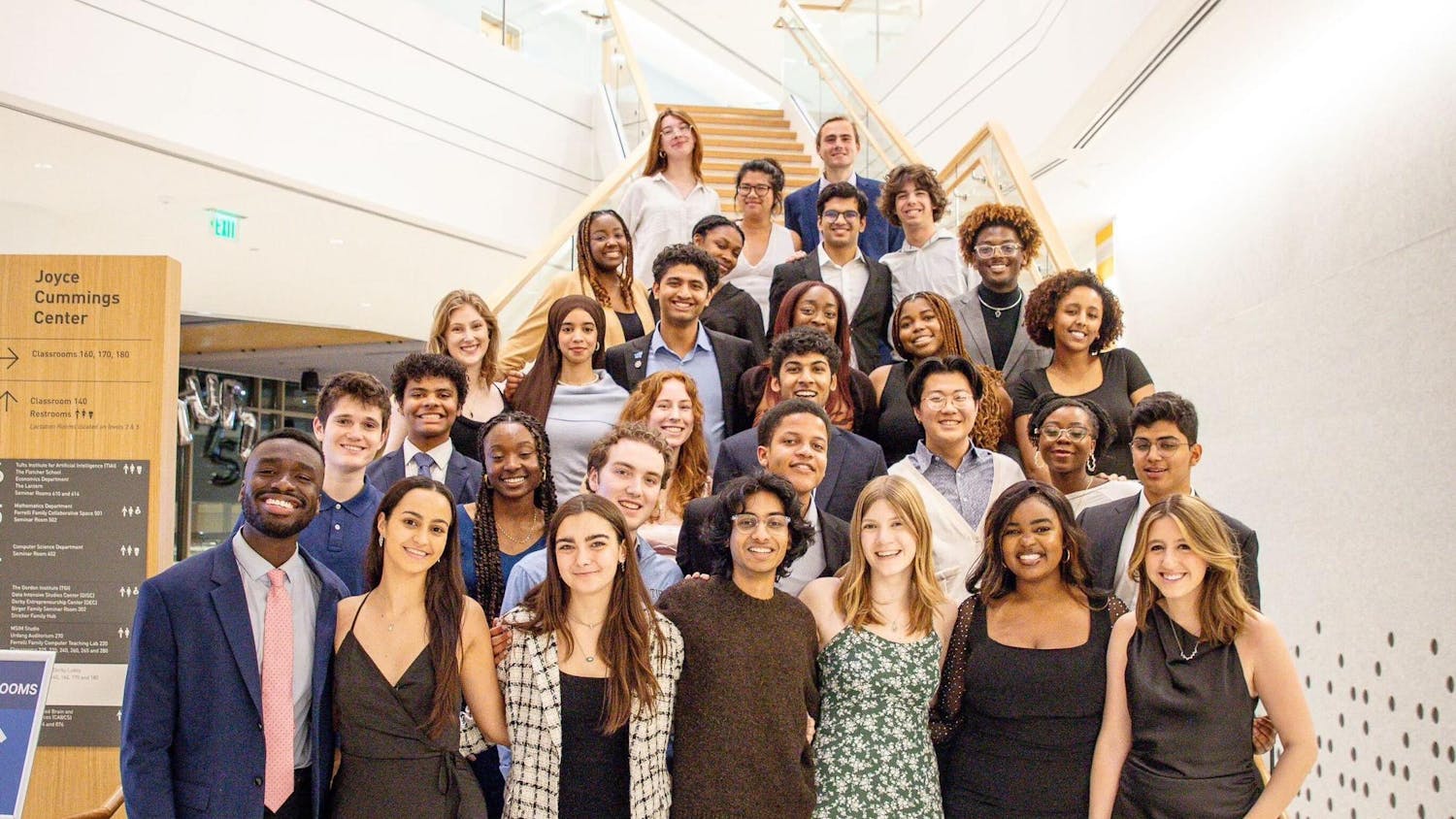U.S. Senator Susan Collins (R-Me) spoke to students and members of the Tufts community about the state of the U.S. government and the future of bipartisanship on Wednesday in the ASEAN Auditorium. Collins' presentation, which was moderated by Associate Professor of political science Eitan Hersh, was the second installment of this semester’s Tisch College Distinguished Speaker Series hosted by Tisch College of Civic Life. The event was co-sponsored by the Tufts Department of Political Science, Tufts Republicans and Tufts CIVIC.
Collins, a Republican, is currently serving her fourth term and is the senior senator from Maine. According to Jessica Byrnes, special projects administrator at Tisch College, Tisch College reached out to Collins’ office in an effort to invite more diverse voices to campus, one of the primary goals of the Distinguished Speaker Series.
“She has voted on both sides of the aisle on a number of issues, so we thought that, considering the gridlock in Congress right now, she would [bring] a really interesting and important view to campus right now,” Byrnes explained.
The event began at 6:30 p.m. and lasted for about an hour and a half. Students and community members filled almost all of the 270 seats in the ASEAN Auditorium. As a current senator, Collins has a limit on the financial gifts that she can receive and was not paid to speak at Tisch, according to Byrnes.
Collins’ talk began with a welcome from Dean of Tisch College Alan Solomont, who called Collins “one of the last survivors of a once-common species of moderate New England government officials.”
Following a question from Hersh about the current state of the Republican party, Collins called for students in the audience to raise their hands if they were content with the current state of the two major political parties. No students raised their hands. Within her own party, Collins attributed this response to Republicans' reluctance to take a progressive stance on social issues.
“Republicans have been slower to evolve on these issues, and that has driven away a lot of young people,” Collins said.
In an interview with the Daily before her presentation, Collins elaborated on students’ discontent with the current state of U.S. politics.
“We are more polarized. We are tending to view those who disagree with us politically as the enemy rather than as someone who has a different viewpoint,” Collins stated. “We are losing the opportunity to get to know one another and to be exposed to different philosophies.”
Collins partially attributes this to the lack of ideological diversity in New England academia.
“It’s particularly important for Tufts and other liberal arts colleges to invite speakers who can broaden the horizons of the students who attend their institutions,” Collins said. “Outside speakers can help counter the bias that is shown by the majority of faculty.”
Collins cited her own college experience with ideologically diverse faculty as pivotal in the development of her own political beliefs and her understanding of those who are not members of her party.
Collins said her Senate career has been defined by her demands for compromise, which she defended during her presentation. Collins repeatedly referenced her Common Sense Coalition, a collection of 26 senators committed to promoting bipartisanship in Congress.
“It’s hard to be a moderate these days in Washington, because you do get shot at at all times by both sides,” Collins stated in her presentation.
Collins also stressed the importance of bipartisan discourse.
“Neither party has the monopoly on good ideas,” Collins said. “We need to restore a sense of civility and a respect for different viewpoints. People should not have to be fearful that if they are a conservative and speak up, then they are going to lose friends.”
In the remainder of the conversation, Collins addressed depoliticizing the judiciary, gun violence, the Trump administration’s tax plan, U.S. Secretary of Education Betsy DeVos, climate change, the budget process and her hopes for the future of bipartisanship in government. She also took time to dispel rumors about her political strategy and joke about the Boston Globe's unfair portrayal of her.
During the time allotted for student questions, two students pointed out that Collins had described several bills that almost passed in the Senate but failed to gain the necessary 60 votes. When they asked about her plans to overcome the gridlock that has categorized politics throughout the lives of most Tufts students, she defended the necessity of a majority in creating legislation.
Collins also advocated for making an effort to understand the motivations of the opposing side.
“Even for those that I vehemently disagree with those on the far left and the far right, I recognized that though they have a very different viewpoint, that they still love this country, they still want what is best for Americans. They just have very different views on how to achieve that,” she told the Daily.
U.S. Senator Susan Collins addresses bipartisanship at Tisch College event

Republican Senator Susan Collins of Maine speaks as a part of the Jonathan M. Tisch College of Civic Life Distinguished Speaker Series.





